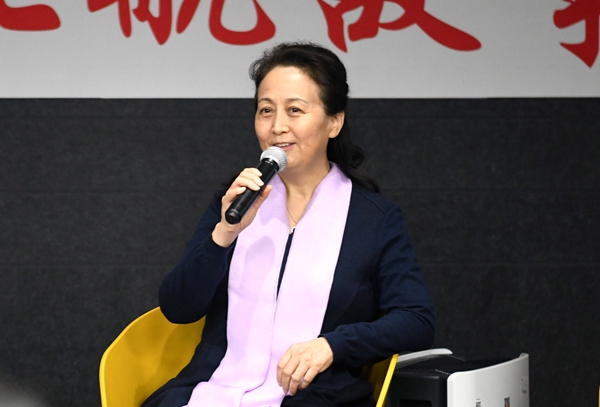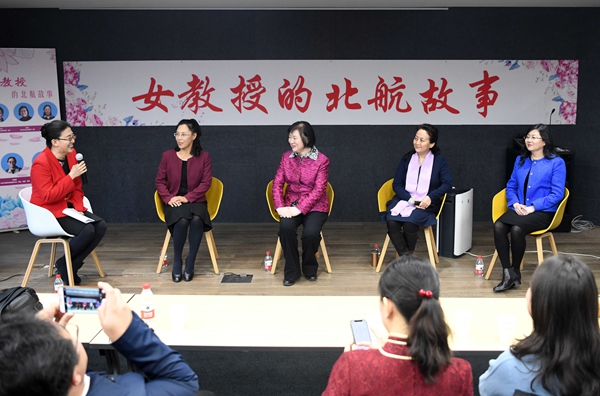
A Star in Her Own Right — Scientist Dedicates Life to Development of Nation's Aerospace Science
During the past decade, she has led her team members in the development of Lunar Palace 1 ("Yuegong-1"), a simulated space "cabin," and the Bioregenerative Life Support System (BLSS), in which humans, animals, plants and microorganisms coexist in a closed environment, simulating a lunar base. Lunar Palace 1 is the first self-contained lunar analogue training habitat developed in China, and the third of its kind worldwide. But who is she? Liu Hong, an academic with the International Academy of Astronautics (IAA) and president of the Research Centre of Space Life Science and Life Support Technology, with the School of Biological Science and Medical Engineering under Beihang University (in Beijing).

Liu Hong shares her career-development experiences during an activity organized by Beihang University on March 7, 2019, the day before International Women's Day.
Lunar Lifestyle in Space 'Cabin'
A white building, with a dome, is eye-catching on the campus of Beihang University. The facility, which is a 500-cubic-meter capsule, which covers 160 square meters, is called Lunar Palace 1. The "palace" is composed of an integrated module and two plant-cultivation modules. The integrated module includes a living room, a work room, a bathroom and a waste-disposal room. In the plant-cultivation modules, you may feast your eyes on the various luxuriant green experimental crops, some of which bear fruit. The facility is the result of Liu and her team's hard work.
Liu will never forget the "glorious moment" when four of her team members, stepped out of Lunar Palace 1 holding cabin-grown fruit and vegetables (including strawberries, soybeans and carrots). That was May 15, 2018. They received cheers and thunderous applause from spectators. That day marked the successful conclusion of the Yuegong-365 experiment, which was initiated on May 10, 2017. During the year-long experiment, eight volunteers, all students from Beihang University, lived in the "palace" separately, in two groups of four. It took the team 370 days to complete the experiment, five days longer than planned. The delay, which was intentional, was so the team could evaluate the physical and mental conditions of the volunteers.
The experiment was Beihang's second attempt to see how the BLSS would work in a moon-like environment. Oxygen, water and food were recycled within the system, which created an Earth-like environment. In 2014, Liu led her team in conducting a successful, 105-day, high-closure integrated experiment in Lunar Palace 1. With that experiment, China became the third country — after Russia and the United States — to establish a high-closure, human-animal-plant-microorganism ecosystem.
"The Yuegong-365 experiment broke a world record for humans' longest stay in a self-contained cabin with the highest degree of closure," says Liu. "We recycled 100 percent of the oxygen and water, and 80 percent of the food humans need. The system is 98 percent self-sufficient. That means if we need 100 kilograms of supplies, we can regenerate 98 kilograms (in the system) by recycling the above-mentioned necessary substances for humans. Therefore, if we want to live on the moon, Mars or other extraterrestrial bodies, we can use the technology to help us survive (on the bodies)."
Based on analyses of the experiment's results, Liu says the team will explore a smaller BLSS facility, which can be loaded onto space labs and on moon and/or Mars probes.
Liu was proud — and satisfied — of the experiment's results. "Despite the many hardships that we endured while we conducted the experiment, we believe all of our efforts were worthwhile," says Liu.
Exploring Universe
For Liu, exploring the universe is a lifelong pursuit rather than a way to make a living. "When I was a little girl, I took delight in looking up at the starry sky," recalls Liu.
During the past 16 years, she has stuck to her childhood dream of exploring the universe. Although the moon has seemed so far away, she has exerted every effort to reach lunar space. To this end, she has read extensively to increase her knowledge about space.
To broaden the team's vision, and to help her team's members improve their professional knowledge, Liu during the past several years has led her team during special tours to Russia, Japan and the United States, to visit the systems (BLSS) developed by the scientists in those countries. Liu's team has benefited greatly from the visits.
The team has yielded, under Liu's guidance, fruitful results through unremitting efforts; the team's members have solved many technically difficult problems, and they have developed theoretical and technological systems.
Despite the hardships, Liu is delighted that her team has scored tremendous achievements in developing the system. That has strengthened her determination to lead her team in making greater efforts to explore the universe.
Pursuing Perfection
Liu's love for aerospace science has inspired her team members, during the past decade, to tirelessly pursue scientific perfection. The members have been praised for their profound love for their country, for their pioneering, innovative spirit of conducting scientific research, and for their devotion to their careers.
During the past few years, Lunar Palace 1 has earned the team many prizes. For example, the Science and Technology Committee, under China's Ministry of Education, in 2015 named the "palace" one of the "top 10 scientific and technological progresses made by Chinese universities."
Given her outstanding achievements, Liu has received many awards and honorary titles, including the National May 1 Labor Medal and National Outstanding Teacher. In January 2019, China Women's News released the list of the Top 10 Female Newsmakers of 2018. Liu made the list.
Liu has sought international cooperation for the development of BLSS as she has worked alongside her team.
"We still have a long way to go (to develop the system) ... We'll stick to our dream of promoting the development of aerospace science," says Liu.

Liu Hong attends an activity marking International Women's Day, which is organized by Beihang University on March 7, 2019.
Photos by He Guanxin
(Source: Women of China English Monthly June 2020 issue)
Please understand that womenofchina.cn,a non-profit, information-communication website, cannot reach every writer before using articles and images. For copyright issues, please contact us by emailing: website@womenofchina.cn. The articles published and opinions expressed on this website represent the opinions of writers and are not necessarily shared by womenofchina.cn.
 京公网安备 11010102004314号
京公网安备 11010102004314号